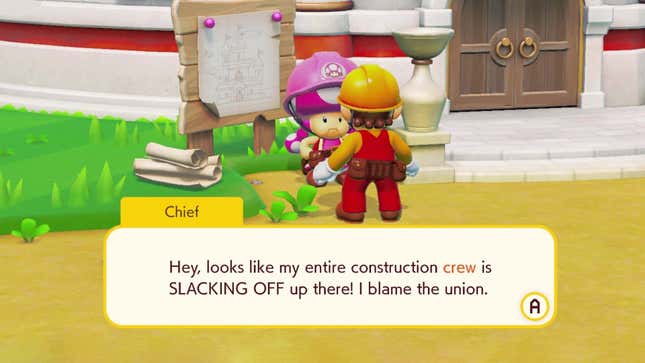
On April 15, an anonymous employee filed a complaint against Nintendo and contracting company Aston Carter with the National Labor Relations Board. The public case docket lists allegations of coercive statements, discharge, retaliation against concerted activities, and surveillance. (Update: The worker recently came forward and claims that they were fired after asking about NoA’s stance on labor unions.)
The complaint’s existence was first reported by Axios. The specifics of the worker’s accusations are not listed on the NLRB website, but “concerted activities” is a term for the rights workers have under NLRB regulations to work together to address workplace-related issues, while “discharge” in this context can refer to illegal firings or a retaliatory refusal to hire organizing workers.
Aston Carter, the organization named in the complaint alongside Nintendo, is a staffing agency that has previously posted jobs for administrative and customer service roles at the games company. The NLRB notified all involved parties about the case yesterday.
This isn’t the first time that employees have filed a labor complaint against a major video game company. Last September, employees from Activision Blizzard went to the NLRB to accuse the Call of Duty publisher of coercing union organizers. While that lawsuit had been helped along by CODE-CWA (Campaign to Organize Digital Employees), the Nintendo complaint is being filed by an individual worker. This case marks the first time that Nintendo has become publicly embroiled in the developing, industry-wide conversation surrounding labor rights.
Video game unions are currently having a major moment amid a backdrop of increasing labor organization in the United States. Raven Software’s QA testers recently formed the first “AAA” game studio union in the United States in response to Activision Blizzard’s layoffs, and previously Vodeo Games recognized the first-ever labor union at an American studio. However, it’s been an upward climb for games industry workers as bosses attempt to manipulate elections, divide workers, and expose staff to anti-union messages.
Despite Nintendo’s relative lack of controversy compared to other major publishers, its workers are as affected by the industry’s changing tides as any other company’s. Last October, Nintendo announced that it would be shutting down offices in Toronto and California. This new labor complaint is likely another sign of how an increasing number of video game workers seem ready to take back control over their working conditions.
Updated: 4/21/2022, 11:15 a.m. ET: Nintendo responded to Kotaku’s requests for comment with the following statement:
We are aware of the claim, which was filed with the National Labor Relations Board by a contractor who was previously terminated for the disclosure of confidential information and for no other reason. Nintendo is not aware of any attempts to unionize or related activity and intends to cooperate with the investigation conducted by the NLRB.
Nintendo is fully committed to providing a welcoming and supportive work environment for all our employees and contractors. We take matters of employment very seriously.
Update: 9/29/2022 at 9:20 A.M. ET: The fired tester recently came forward in an Axios interview. Mackenzie Clifton claims that they were let go a month after asking NoA president Doug Bowser, “What does NoA think about the unionization trend in QA in the games industry as of late?” Nintendo denies this, saying that the firing was over disclosing “confidential information.” Clifton is asking for an apology letter from Bowser as part of the settlement. The lawsuit is still ongoing.